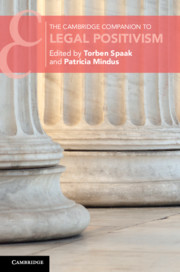Book contents
- The Cambridge Companion to Legal Positivism
- Cambridge Companions to Law
- The Cambridge Companion to Legal Positivism
- Copyright page
- Contents
- Figures
- Contributors
- Acknowledgements
- 1 Introduction
- Part I Fundamentals
- Part II History
- Part III Central Figures
- Part IV Main Tenets
- Part V Normativity and Values
- 24 Legal Positivism and Meta-Ethics
- 25 The Normativity of Law
- 26 An Italian Path to Legal Positivism: Ferrajoli’s Garantismo
- Part VI Critique
- Index
- References
26 - An Italian Path to Legal Positivism: Ferrajoli’s Garantismo
from Part V - Normativity and Values
Published online by Cambridge University Press: 21 January 2021
- The Cambridge Companion to Legal Positivism
- Cambridge Companions to Law
- The Cambridge Companion to Legal Positivism
- Copyright page
- Contents
- Figures
- Contributors
- Acknowledgements
- 1 Introduction
- Part I Fundamentals
- Part II History
- Part III Central Figures
- Part IV Main Tenets
- Part V Normativity and Values
- 24 Legal Positivism and Meta-Ethics
- 25 The Normativity of Law
- 26 An Italian Path to Legal Positivism: Ferrajoli’s Garantismo
- Part VI Critique
- Index
- References
Summary
Moreso writes about a theory of law related to legal positivism that has been highly influential in the Latin world, namely, Luigi Ferrajoli’s garantismo, or theory of constitutional guarantees or warrants. He explains that the word ‘garantismo’ suggests a conception of law as a system of constitutional guarantees of human rights, and distinguishes two main ideas in Ferrajoli’s account: the separation thesis and the distinction between valid law and law in force. For Ferrajoli, the very idea of constitutional rights gives rise to a distinction between validity and social efficacy, because even though the legislature might enact a statute that violates a constitutional right, the statute might become socially effective, and this means that there might be legally invalid norms that are nevertheless in force. Moreso also introduces Ferrajoli’s distinction between a constitutionalism of guarantees and a constitutionalism of rights, which he criticises, arguing, in particular, that accepting the rule/principles distinction does not have to lead to lack of legal certainty. Finally, he points out that Ferrajoli is an inclusive legal positivist.
- Type
- Chapter
- Information
- The Cambridge Companion to Legal Positivism , pp. 606 - 624Publisher: Cambridge University PressPrint publication year: 2021
References
- 5
- Cited by

